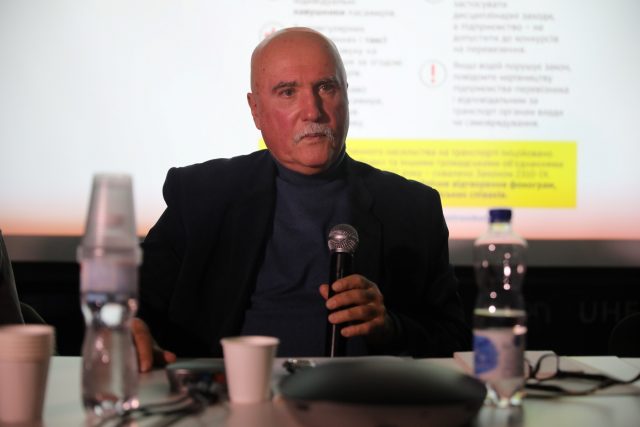Acoustic military terror: defining characteristics and its multifaceted impact on Ukrainians, encompassing daily routines and health changes.
by Igor Rushchenko, Doctor of Sociology, Member of the Board of the Sociological Association of Ukraine, Professor of V. Karazin Kharkiv National University
October 18, 2024, the VII Kharkiv Security Forum “Civilian Ukrainians: Challenges and Resilience in the Conditions of Terrorist War” was held in Kharkiv. The forum was organized by the Maidan Monitoring Information Centre and the Konrad Adenauer Foundation with the support of the Humanitarian Coordination Center.
The forum expert speeches are published here.
What kind of war is this? In one word, it is vile. In four words, it is imperial, colonial, genocidal, and terrorist. It is waged in two dimensions: it is combat operations and terror against the civilian population.
Russia is the birthplace of terror
Russia is the birthplace of terror. However, back then, in the 19th century, terror was a little different. Back then, when it all started, it was individual, selective. That is, somehow politically motivated in a sense. And it was an asymmetric response from the weaker side.
This was the tactic of secret underground organizations that were being persecuted. And with this they justified their violence.
In the 20th century, terror changed. First, it became state-based. And it was Moscow that invented such tactics after the revolution. The Kremlin carried out state terror. And then it continued in various forms, practically throughout the years of Soviet rule. Then terror became mass and not selective. And here, you know, various terrorist organizations of the world joined in. And the peak of this tactic was 2001, September 11. The events in America are well-known. And now we see military terror.
First, military terror is characterized by its systematicity and scale. Well, its goals are the same as any form of terror: to break the will of the enemy, bring him to his knees, and so on. And here I still want to show the place of acoustic terror. The word “systematicity” is not just such an expression of language. Because we see several clear directions in which Russia is terrorizing Ukraine.
These are attacks on residential infrastructure with the death of peaceful Ukrainians, these are attacks on critical infrastructure, these are attacks on economic infrastructure, commercial facilities, logistics infrastructure. Attacks on the environment, the blowing up of dams, barrages, burning of forests and so on. Attacks on cultural infrastructure, cultural heritage. Psychological terror. And finally, we also highlight acoustic terror, which was not mentioned at all before.
All the signs of terrorism are present in acoustic terror
All four of these signs of terrorism are absolutely traceable in acoustic terror: the commission or threat of committing generally dangerous acts, the public nature of the execution with the claim to a wide resonance (and the resonance here is huge both metaphorically and as a physical phenomenon), the deliberate creation of a state of fear and tension in society. And the fourth sign, it is very important for the qualification of terrorism: the use of violence against some individuals — that is, us, civilians — in order to induce certain behavior of other individuals. And these other individuals are the government, this leadership, these are politicians who make strategic decisions.
I added a fifth characteristic. This is the extraordinary mass nature of this type of terrorism. Because not even hundreds of thousands suffer from acoustic terror. Take Ukraine: millions and millions of Ukrainians, practically all of Ukraine suffers from this. Well, a city like Kharkiv is a victim number one.
If at the beginning of the war people mostly looked for a bomb shelter or a safe place in their apartment, in the house, then today 70% do not react at all. Well, how come they don’t react? They react psychologically, but people’s behavior does not change. That is, people go about their usual business, go to work on the streets, and do whatever they want. Although there is always a state of anxiety, danger in their heads.
But, as you can see, we have changed over these months, years of war. We have somehow adapted to this situation. By the way, this is not so bad. Because Ukrainians show an example of indomitableness. Namely, that people can exist in these conditions, continue to live, fulfill their duties.
And every such sound, I believe, causes trauma to a person. Well, we may not feel it as “I was just traumatized.” But these are microtraumas. They accumulate, add up, integrate. And their consequences are negative.
Origins of trauma
I also singled out two types of trauma origins.
One is traumatization via social media. We experience these cases through contacts, social media, phone calls, television news. We can’t help but worry because we see the destruction, we see the suffering of people, we worry about our loved ones. People grab their phones, call, ask “how are you?”, “is everything okay or not?”
The second is destructive autosuggestion. This is a process in a person’s consciousness when they carry experiences within themselves. And these experiences accumulate and do not let go.
It should be noted here that the reaction to an explosion is not just a reaction to a loud sound. It is a reaction of horror. Here, a person’s negative emotions are powerfully included. Because in the mind, a picture of war, death, destruction is projected. And fear for oneself and for one’s loved ones.
So here we need to distinguish between aspects of just sonic violence, loud sound. This is a lesser threat during war. And the second is this terrible projection. And people’s reactions are very different.
I was struck by the story of one of our respondents, who is a doctor herself. They brought their colleague, a female woman, to the hospital with a suspected stroke. Well, her body was semi-paralyzed there. But then they figured out that it was a reaction to the explosion. You see, this is the state a person was in.
And the second story is again from a doctor. But another psychiatrist, by the way, had an inadequate reaction… Well, what reaction can be adequate, I wonder? She had a reaction to the sound of a siren. One colleague, her legs failed. That is, she had such a pathological reaction, she asked to be taken indoors. She couldn’t move herself.
Projection syndrome
We encountered effects that we called projection syndrome. That is, the projection of sounds in our minds.
This is a distorted projection of any more or less powerful, loud sounds associated with the sounds of war. Moreover, perhaps this is a healthy reaction of the body. It is reflexive. I hear a bang, my body reflexively, unconsciously, reacts. Because this is a natural reaction for a person to a threat.
And then consciousness turns on. And I analyze, after a few microseconds or seconds I understand that this is not a sound of war, that this is something else. And when we started asking people about this effect, almost 100% agreed that yes, it exists. And they even started to say what exactly causes this effect in them.
Well, I wrote down some things here: garbage trucks, cars, motorcycles that run on gas without exhaust pipes, which really annoyed people during the war. And these idiots who don’t understand this, who drive around. Well, we need to put things in order.
The slamming of doors in the entrances, the sounds of the lawnmower, any loud noises, banging on iron, thunderstorms. Yes, I felt it myself. Because thunder strikes, they are clearly associated with explosions. It is difficult to distinguish.
The sounds of sirens burden the psyche
The sounds of sirens strain our psyche. How many times a day do we hear sirens? 10-15 times.
People wrote, wrote a lot. And here is one such message: “I have been abroad for more than a year. But I still feel a threat to my life when I hear a loud sound.” That is, more than a year. “A month ago in kindergarten I pulled my child to the floor and covered her with myself when the cabinet banged loudly above her head.” Well, this reaction is typical projection syndrome. “It seems to me that this will never end, although the pills from the psychiatrist help me hold on.” That is, the woman is conscious, she understands her condition, she is being treated, she is trying to get rid of it. But you see, a year has passed and the banging of the cabinet, therefore, led to such a completely inadequate, at first glance, reaction. Although the reaction is correct: to fall to the floor and press the child. Perhaps this woman left the territory that was intensively shelled, including by artillery.
But here are two identical situations, although different people and in different cities. The first in Lviv, the second in the Czech Republic. “When we were in Lviv on a business trip, we kept hearing quite heavy doors slamming on the first floor when people came in or went out. And this sound kept everyone tense. And there were Kharkiv residents, people from Zaporizhia, Kherson.” Well, that is, all those who left the zone of intense shelling. “Here in the Czech Republic, the situation is exactly the same at an international conference.” He says: “There were four people from Ukraine with us, and we all reacted the same when the doors slammed loudly in the hotel.” That is, it’s only for Ukrainians. Everyone else perceived it as it should be — it’s normal. But, well, that’s probably our fate.





